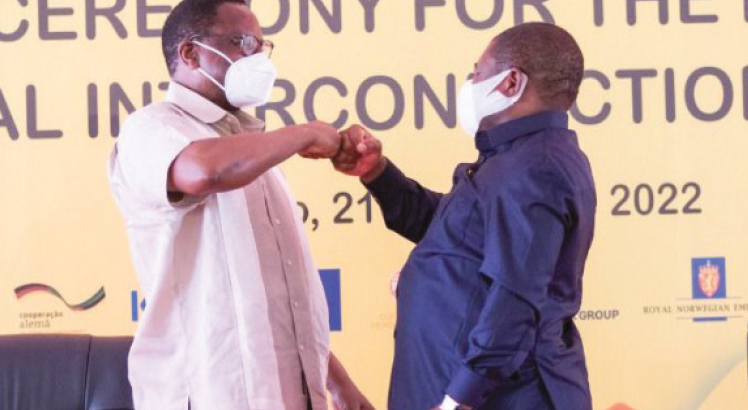President Lazarus Chakwera says Malawi has re-engaged Mozambique’s power supply company EDM to increase by 60 megawatts (MW) the electricity it will be supplying under the interconnection deal.
If approved, the extra 60MW will add on the initially agreed 50MW, giving the Electricity Supply Corporation of Malawi (Escom) grid an additional 110MW from the Malawi-Mozambique Power Interconnector line.
Yesterday, Chakwera and his host President Filipe Nyusi attended a ceremony to lay a foundation stone for the construction of the 400 kiloVolts (kV) Mozambique-Malawi Transmission Line Project in Tete.

On November 23 2021, Chakwera and Nyusi also laid a foundation stone on the Malawi side at Phombeya Substation in Balaka for the same project. The interconnector covers 76 kilometres (km) on the Malawi side and 142km in Mozambique.
During yesterday’s ceremony, Chakwera said the project seeks to establish a transmission link between the two countries to meet increasing electricity demand in Malawi. The line is also expected to create opportunities for trade in the Southern African Power Pool.
In a speech made available to The Nation, the Malawi President said: “This transmission line will provide a safe and reliable interconnection of power which will enable initial supply of 50MW of power from Mozambique due to Malawi. The interconnector will also provide room for Malawi to tap more and/or export power into the Southern African Power Pool.”
In a telephone interview yesterday, former Millennium Challenge Account chief executive officer Dye Mawindo said the interconnection was long overdue and provides Malawi with an opportunity to participate in the regional power market.
He said: “We must not be myopic about this project. Malawi today could be seen to be a net importer, but it will also be able to export power.
“Look, during night hours we do not use power as much as others, so this is the power we can export to others. But even when we grow our generation capacity we will be able to export power to others because we have the connection.”
Mawindo, who headed the implementing agency of the United States-funded $350 million energy compact that improved local distribution and generation capacity, said Malawi was among the few countries that were not connected to the regional power pool.
The interconnector will run from Matambo in Mozambique’s central Tete Province into Malawi through Mwanza and Neno districts to Phombeya in Balaka.
Financiers of the project include the World Bank, the German development bank KfW and the European Bank who have shouldered a financial burden of $154 million [about K127 billion] among them.
Malawi faces a 298MW power generation deficit following the commissioning of the 19.1MW Tedzani IV Hydro Power Station in July last year and the JCM Matswani Solar Corporation Limited 60MW plant in Salima.
The country’s current electricity demand is projected at about 800MW.
During the State visit to Mozambique, Chakwera also visited the Nacala Port in Nampula Province. He described the port as a vehicle for spurring and fostering economic development and job creation for both Mozambican and Malawian economies.
The Malawi President hailed Nyusi for his vision to rehabilitate and modernise the port to the advantage of regional integration.
Malawi and Mozambique have also partnered in the rehabilitation of the Sena Railway line which connects Malawi to the Indian Ocean port of Beira.
The current administration’s improved relationship with Mozambique evokes memories of how relations between the two countries sunk to a record low during Bingu wa Mutharika’s administration.
The strained diplomatic ties cost Malawi an opportunity to launch what was called the Nsanje World Inland Port in 2011 after Mozambique impounded a barge destined for the inauguration.
Economist Milward Tobias, who is also executive director of Centre for Research and Consultancy, argues that Malawi needs Mozambique more for purposes of trade and economic growth.
Providing figures, he said in 2020 alone Mozambique exported to Malawi goods worth $99 million while Malawi exported to Mozambique $16.4 million goods.
“The geographical proximity is an advantage while the language [Portuguese versus English] may be a setback. Efforts should be made to strengthen trade between the two countries,” Tobias observed.
Source: The Nation_Friday,22 April 2022_By Suzgo Chitete_Staff Writer
